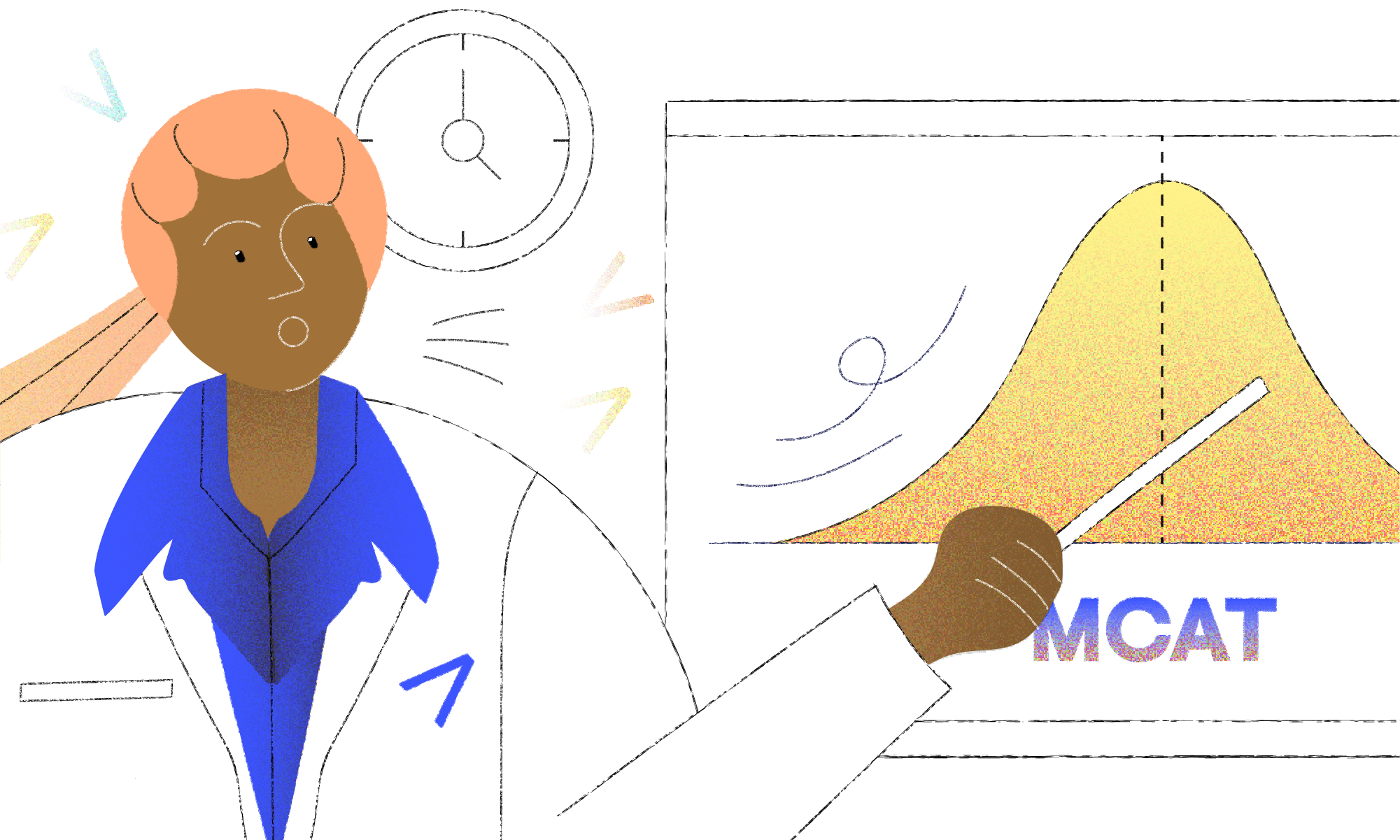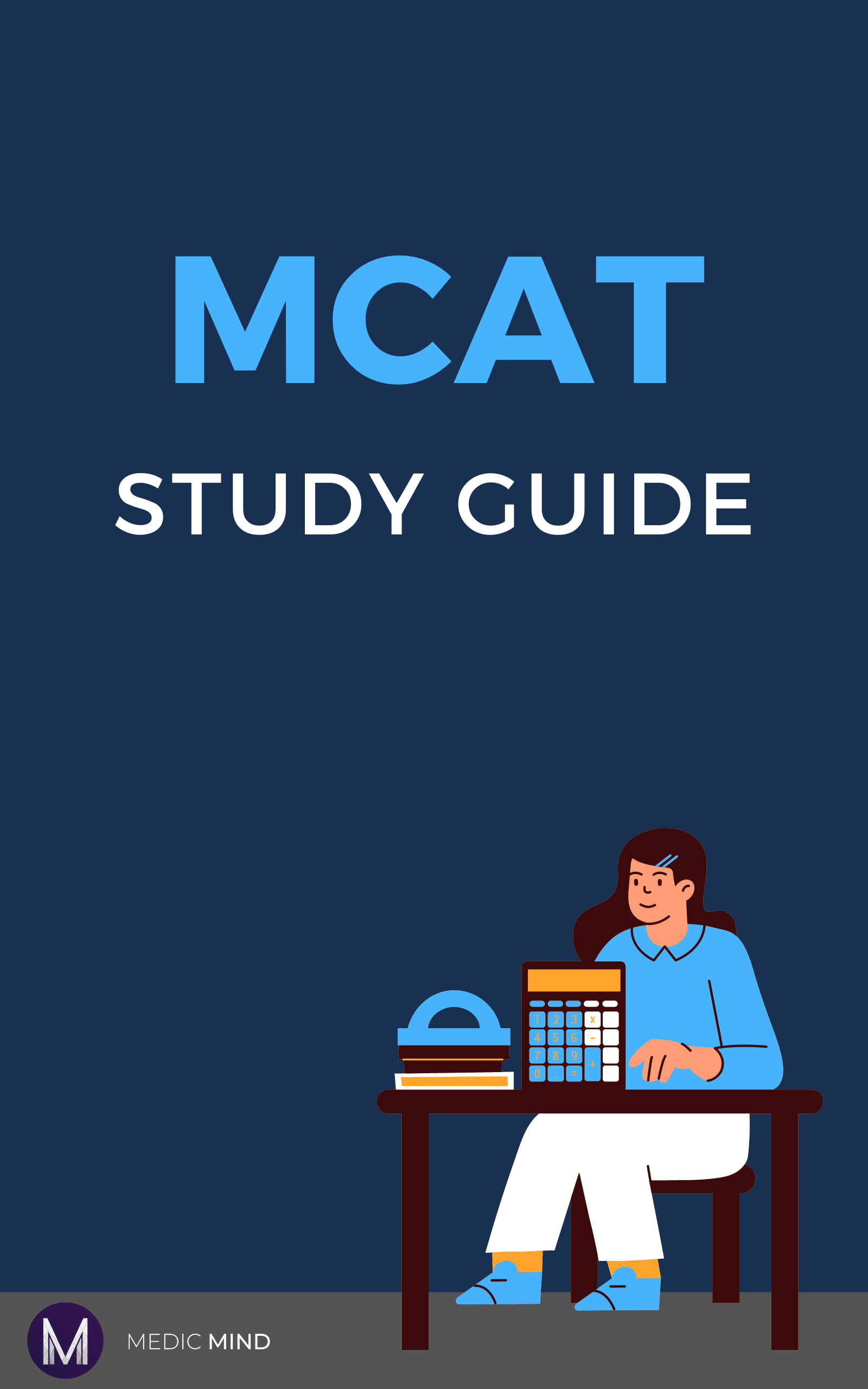
MCAT Biochemistry 101: Essential Topics and Strategies
Is Biochemistry on the MCAT?
Biochemistry makes up 25% of the MCAT. Therefore, understanding its essential concepts and strategies is key to your success in the exam. Whether you’re an aspiring medical student or a pre-med looking to conquer this challenging subject, this blog will surely guide you.
In this comprehensive resource, we’ll delve into the core principles of biochemistry, decode complex concepts, and provide you with practical strategies to ace the MCAT biochemistry questions. Get ready to unravel the secrets of biomolecules, metabolic pathways, and cellular processes while gaining the confidence you need to excel in your MCAT journey.
Core Topics in MCAT Biochemistry
Here are frequently tested core topics in the biochemistry section of the MCAT:
Amino Acids and Protein Structure:
A strong understanding of amino acids is fundamental as they are the building blocks of proteins and will probably feature in biochemistry on MCAT. Familiarize yourself with the 20 common amino acids, their properties, and their classifications. Additionally, learn about the different levels of protein structure, including primary, secondary, tertiary, and quaternary structures.
Enzymes and Enzyme Kinetics:
Enzymes are biological catalysts that play a vital role in biochemical reactions. Focus on enzyme kinetics, including factors affecting enzymatic activity, such as temperature, pH, and substrate concentration. Understand concepts like Michaelis-Menten kinetics, enzyme inhibition, and enzyme regulation.
Metabolism:
Metabolism encompasses the chemical reactions that occur within living organisms. Familiarize yourself with the pathways involved in catabolism (breaking down molecules) and anabolism (building molecules). Key pathways to focus on include glycolysis, the citric acid cycle, oxidative phosphorylation, and gluconeogenesis.
Carbohydrate, Lipid, and Nucleic Acid Metabolism:
Dive deeper into the metabolism of carbohydrates, lipids, and nucleic acids. Understand how these macromolecules are synthesized, broken down, and utilized by the body. Pay special attention to essential concepts like glycolysis, fatty acid synthesis and oxidation, and DNA replication.
Biochemical Techniques:
Develop a working knowledge of common biochemical techniques used in research and diagnostics. These techniques may include chromatography, electrophoresis, spectroscopy, and DNA sequencing. Understanding these techniques will enable you to interpret experimental data and solve related MCAT questions.
MCAT Practice Questions with Answers Explained
Question 1: Enzyme Kinetics
Problem: An enzyme exhibits Michaelis-Menten kinetics with a Vmax of 50 µmol/min and a Km of 2 mM. If the substrate concentration is increased to 4 mM, what will be the approximate reaction rate?
A. 25 µmol/min
B. 33.3 µmol/min
C. 50 µmol/min
D. 100 µmol/min
Answer: B
Explanation:
Michaelis-Menten kinetics describe the enzyme-substrate interaction. When [S] = Km, the reaction rate is Vmax/2. In this case, doubling the substrate concentration to 4 mM places it at Km, resulting in a reaction rate of Vmax/2, which is 50 µmol/min ÷ 2 = 25 µmol/min.
Question 2: Protein Structure
Problem: In a protein’s secondary structure, what type of bonding stabilizes the alpha helix formation?
A. Hydrophobic interactions
B. Ionic bonds
C. Peptide bonds
D. Hydrogen bonds
Answer: D
Explanation:
The alpha helix structure in proteins is stabilized by hydrogen bonds between the carbonyl oxygen of one amino acid and the amide hydrogen of an amino acid four residues away.
Question 3: Bioenergetics
Problem: During cellular respiration, which molecule serves as the final electron acceptor in the electron transport chain?
A. Oxygen
B. Carbon dioxide
C. Water
D. Glucose
Answer: A
Explanation:
Oxygen is the final electron acceptor in the electron transport chain, forming water in the process.
Question 4: DNA Replication
Problem: Which enzyme is responsible for unwinding the DNA double helix during DNA replication?
A. DNA ligase
B. DNA polymerase
C. Helicase
D. RNA polymerase
Answer: C
Explanation:
Helicase is the enzyme responsible for unwinding the DNA double helix, creating the replication fork during DNA replication.
Question 5: Lipid Structure
Problem: What is a common structural feature of phospholipids found in cell membranes?
A. Three fatty acid tails
B. A phosphate head and two fatty acid tails
C. Two phosphate heads and one fatty acid tail
D. Four phosphate heads
Answer: B
Explanation:
Phospholipids in cell membranes consist of a hydrophilic phosphate head and two hydrophobic fatty acid tails, forming the characteristic bilayer structure.
Question 6: Hormone Action
Problem: How do steroid hormones primarily exert their effects on target cells?
A. Binding to cell membrane receptors
B. Activating second messenger systems
C. Entering the nucleus and affecting gene expression
D. Inducing conformational changes in enzymes
Answer: C
Explanation:
Steroid hormones, being lipophilic, can enter target cells and bind to intracellular receptors. This hormone-receptor complex then translocates into the nucleus, influencing gene expression.
Question 7: Enzyme Regulation
Problem: What is a characteristic feature of allosteric enzymes?
A. They only have one substrate binding site
B. Their activity is not affected by regulatory molecules
C. They exhibit cooperativity in substrate binding
D. They always follow Michaelis-Menten kinetics
Answer: C
Explanation:
Allosteric enzymes display cooperativity, meaning the binding of one substrate molecule influences the binding of subsequent molecules, leading to a non-linear relationship between substrate concentration and reaction rate.
Foolproof Strategies for Acing MCAT Biochemistry
To succeed in MCAT Biochemistry, here are some strategies you can employ:
1. Start Early and Plan Your Study Schedule
Begin studying about three to six months before your MCAT test date, depending on how many hours you can devote to studying daily. This gives you enough time to learn the information but doesn’t leave you with so much extra time that you begin to forget the information. Plan your study schedule in advance, allocating dedicated time for Biology and Biochemistry on MCAT.
2. Get Expert Help from Tutors
Expert guidance can significantly enhance your chances of success when preparing for the MCAT Biochemistry section. Medic Mind offers a trusted 1-1 tutoring program designed to provide personalized support. With a team of top-tier tutors, including the top 1% of academic achievers, Medic Mind ensures high-quality instruction.
Through Medic Mind’s 1-1 tutoring program, you’ll receive a customized study plan tailored to your needs. These experienced tutors will assess your strengths and weaknesses, helping you maximize your preparation time efficiently. Additionally, you’ll gain access to a wealth of resources, including video tutorials, question banks, and mock papers, enhancing your practice and reinforcement.
With a strong reputation backed by over 50 schools, Medic Mind is a trusted name in MCAT preparation. Their commitment to excellence and personalized support makes them an invaluable resource for mastering MCAT Biochemistry.
3. Practice with MCAT Practice Tests
Once you’ve begun reviewing and studying biology and biochemistry, incorporate MCAT practice tests into your routine. Third-party practice tests are great during the initial stages of studying. As you approach your test date, prioritize taking the AAMC practice tests. These tests closely resemble the actual exam, so complete every AAMC practice test available.
4. Incorporate Regular MCAT Biochemistry Practice Questions
In addition to practice tests, integrate regular practice questions focused on Bio/Biochem into your study sessions. Utilize test preparation techniques like spaced repetition and periodic reinforcement to ensure the retention of high-yield topics, such as amino acids. Regularly revisiting these topics will help reinforce your understanding and retention.
5. Enhance Critical Thinking Skills
Because the Bio/Biochem section tests your ability to think critically about information, it’s imperative to take your preparation beyond mere factual knowledge. Practice analyzing and manipulating information through practice tests. The more you engage in critical thinking exercises, the better you’ll be able to demonstrate your skills on test day.
6. Identify and Prioritize Weak Areas
As you progress in your studies, you’ll identify your strengths and weaknesses. Adjust your study time accordingly, devoting more or less time to Bio/Biochem based on your needs. This approach ensures efficient use of your study time and prevents unnecessary review of mastered information.
7. Strengthen Active Reading and Graph Interpretation
In addition to learning the content, focus on enhancing your skills in two critical areas: active reading and interpreting graphs, figures, and tables. Active reading involves engaging with passages, highlighting key information, taking notes, summarizing content, and organizing information effectively.
Similarly, practice interpreting graphs, figures, and tables, identifying essential elements such as titles, axes, independent and dependent variables, and patterns. Regular practice of these skills will enable you to comprehend and analyze information during the exam swiftly.
MCAT Biochemistry 101: Summing Up
In a nutshell, mastering MCAT Biochemistry is vital for your exam success. Start early, understand the facts, and apply your knowledge. Practice with tests and questions focused on Biochemistry. Improve critical thinking by analyzing and manipulating information. Adjust your study time based on your strengths and weaknesses.
Enhance active reading and graph interpretation skills. Consider getting expert help from Medic Mind’s 1-1 tutoring program for personalized guidance and study materials. By following these strategies, you’ll be well-prepared to excel in the MCAT Biochemistry section and achieve your goals.
FAQs:
→ How much time should I dedicate to studying MCAT Biochemistry?
The recommended study time for MCAT Biochemistry varies, but generally, three to six months of focused preparation is ideal. Dedicate enough hours per day based on your schedule, ensuring sufficient time to learn and retain the information without overwhelming yourself.
→ How can I improve my critical thinking skills for the MCAT Biochemistry section?
Engage in regular practice tests and questions that require critical thinking and application of knowledge. Analyze the reasoning behind each answer choice and understand why certain options are correct or incorrect. Focus on identifying key patterns, connecting, and applying conceptual understanding to different scenarios.
→ How can I balance studying for MCAT Biochemistry with other sections of the exam?
Initially, allocate equal time to all four sections of the MCAT. As you progress, adjust your study time based on your strengths and weaknesses. Devote more time to Biochemistry if needed, ensuring efficient use of your study hours and avoiding the unnecessary review of mastered concepts.
→ What should I do if I find MCAT Biochemistry overwhelming?
Break down the topics into smaller, manageable portions, focusing on one concept at a time. Seek clarification from tutors, join study groups, or utilize online forums to discuss challenging areas. Practice regularly and gradually build your understanding and confidence in tackling biochemistry questions.
→ Can I succeed in MCAT Biochemistry if I haven’t taken an extensive biochemistry course in college?
Yes, you can still succeed in MCAT Biochemistry even without an extensive college course. The MCAT is designed to test your understanding and application of fundamental biochemistry








Was this article helpful?
Still got a question? Leave a comment